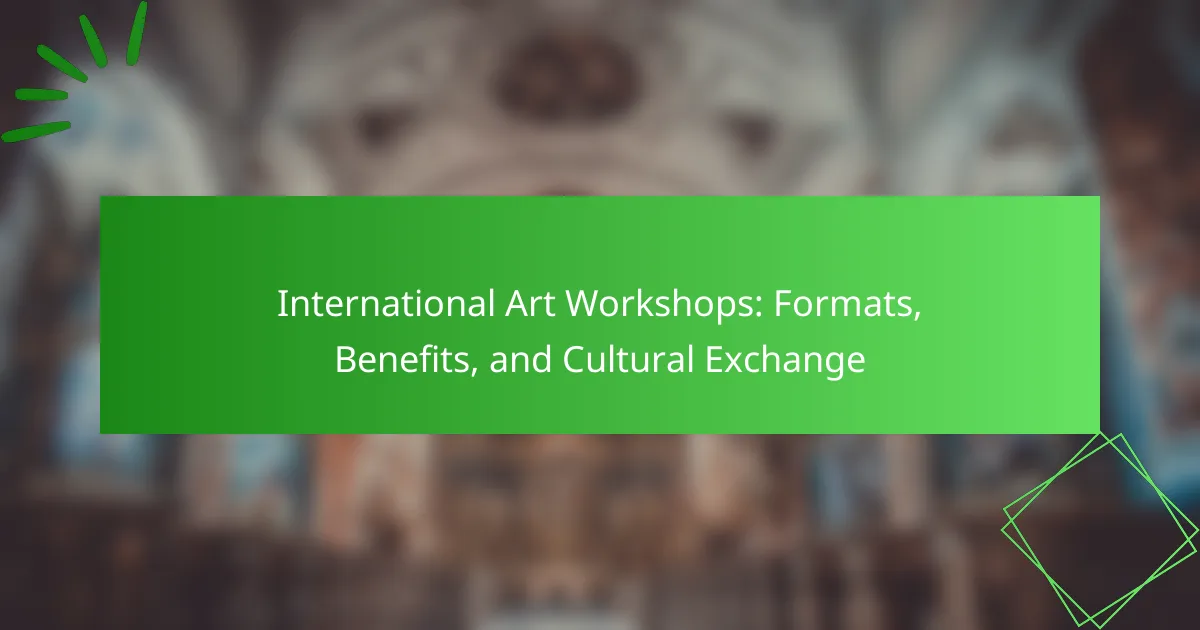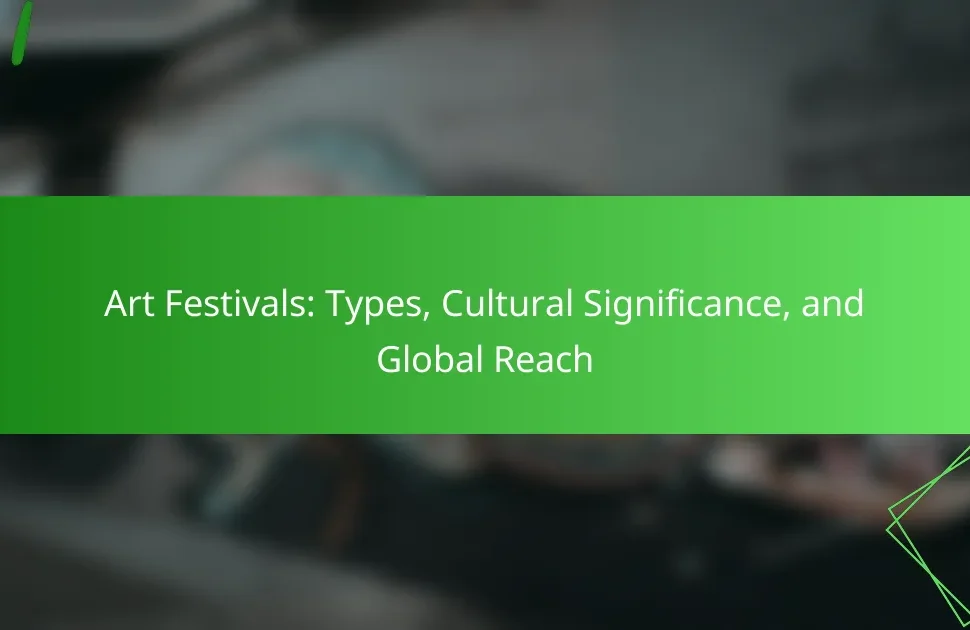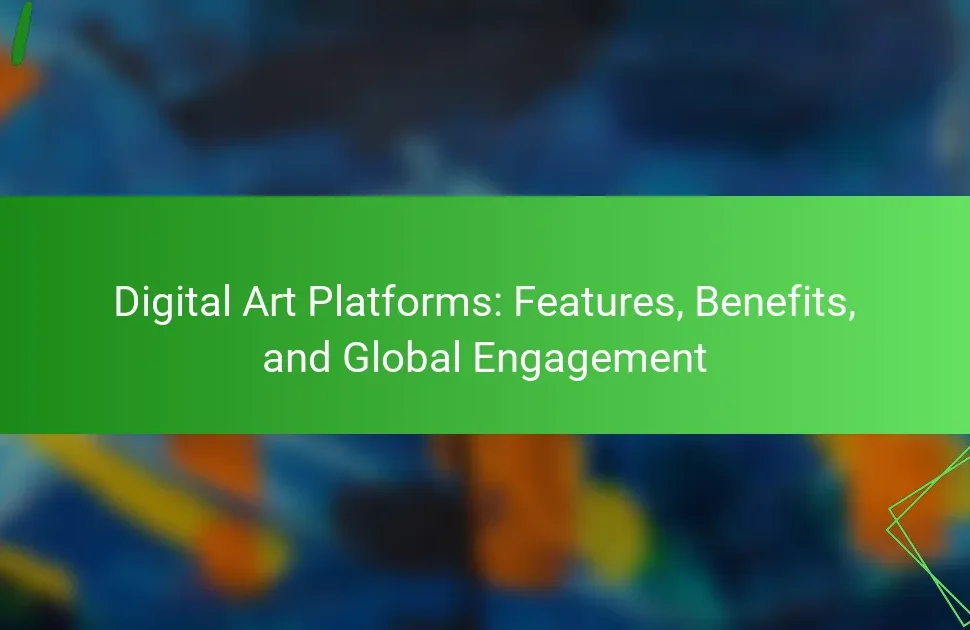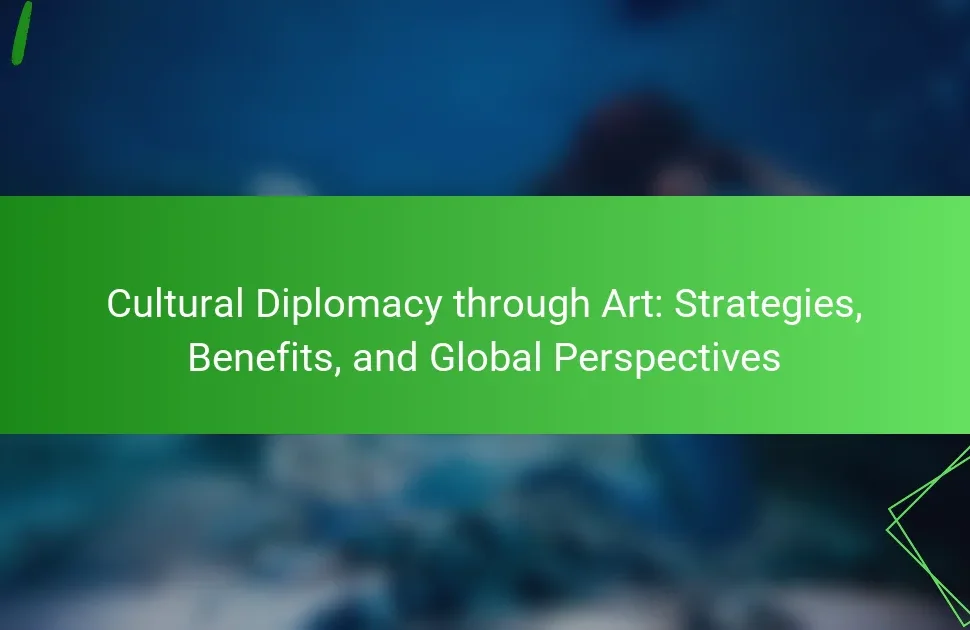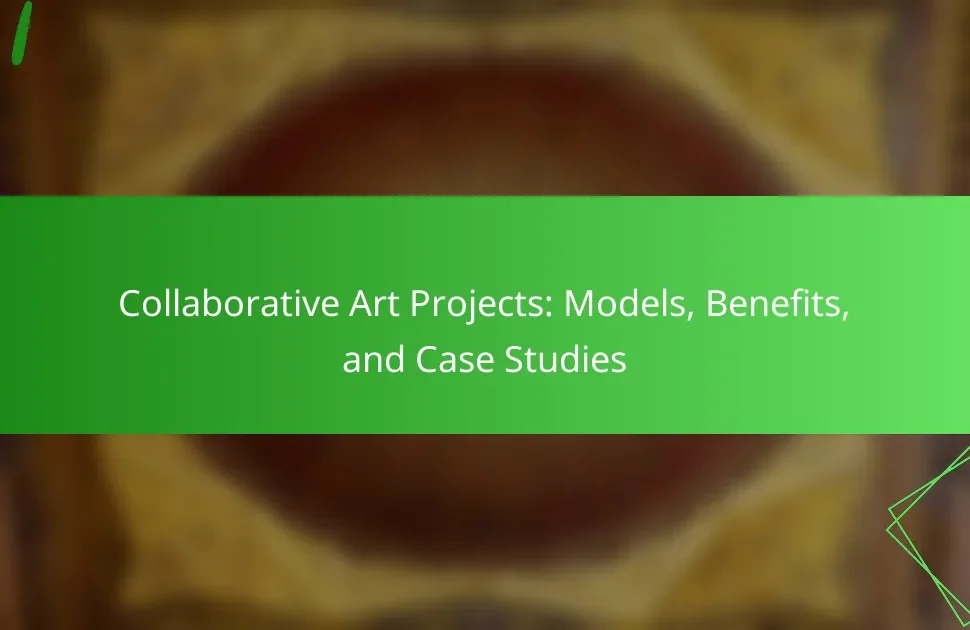International art workshops offer unique opportunities for creativity, cultural exchange, and skill development. They come in various formats, including in-person sessions, online courses, and hybrid models. Participants benefit from collaboration with diverse artists, gaining new techniques and perspectives. Notable organizations like UNESCO and the International Association of Art play key roles in facilitating these enriching experiences.
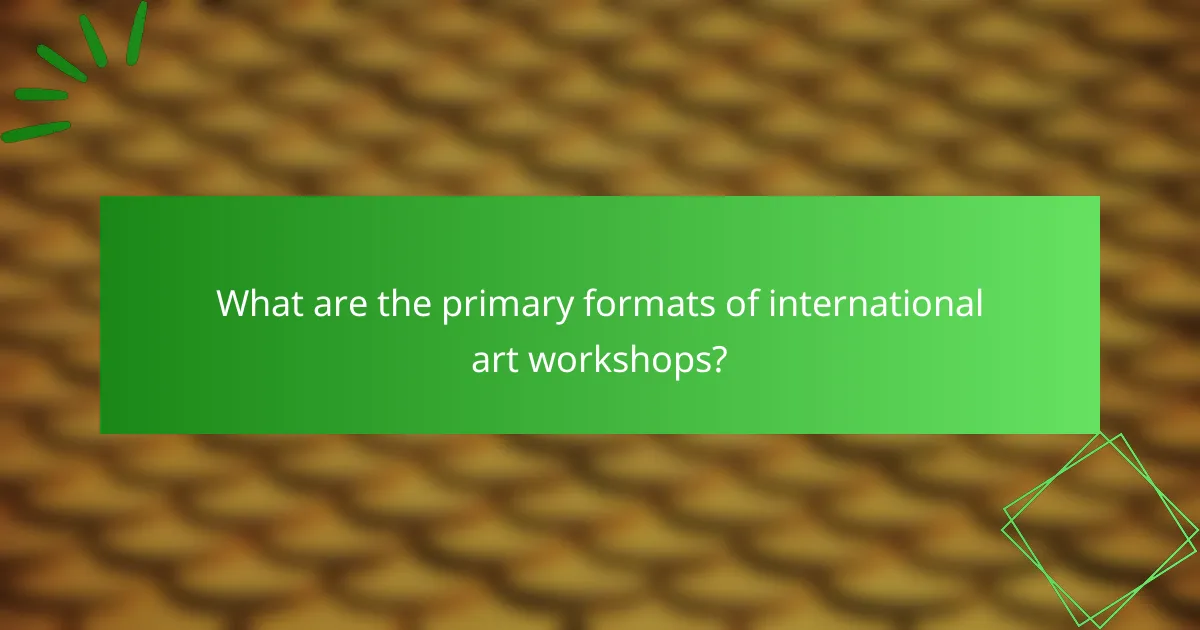
What are the primary formats of international art workshops?
International art workshops primarily take place in formats such as in-person sessions, online courses, and hybrid models. In-person workshops foster direct interaction and hands-on learning, while online courses provide flexibility and accessibility. Hybrid models combine both approaches, enhancing cultural exchange and collaboration. Each format offers unique benefits tailored to diverse participant needs.
How do online workshops differ from in-person experiences?
Online workshops offer flexibility and accessibility, while in-person experiences provide direct interaction and hands-on learning. Online formats allow participants from various locations to engage, fostering a broader cultural exchange. In contrast, in-person workshops enhance networking opportunities and immediate feedback, enriching the learning experience. Each format has unique benefits that cater to different preferences and learning styles.
Which hybrid models are gaining popularity in 2025?
Hybrid models gaining popularity in 2025 include online-offline workshops, collaborative art projects, and immersive cultural exchanges. These formats enhance accessibility, foster global participation, and encourage diverse artistic expressions. As artists increasingly seek community engagement, these models facilitate deeper cultural connections and shared experiences.
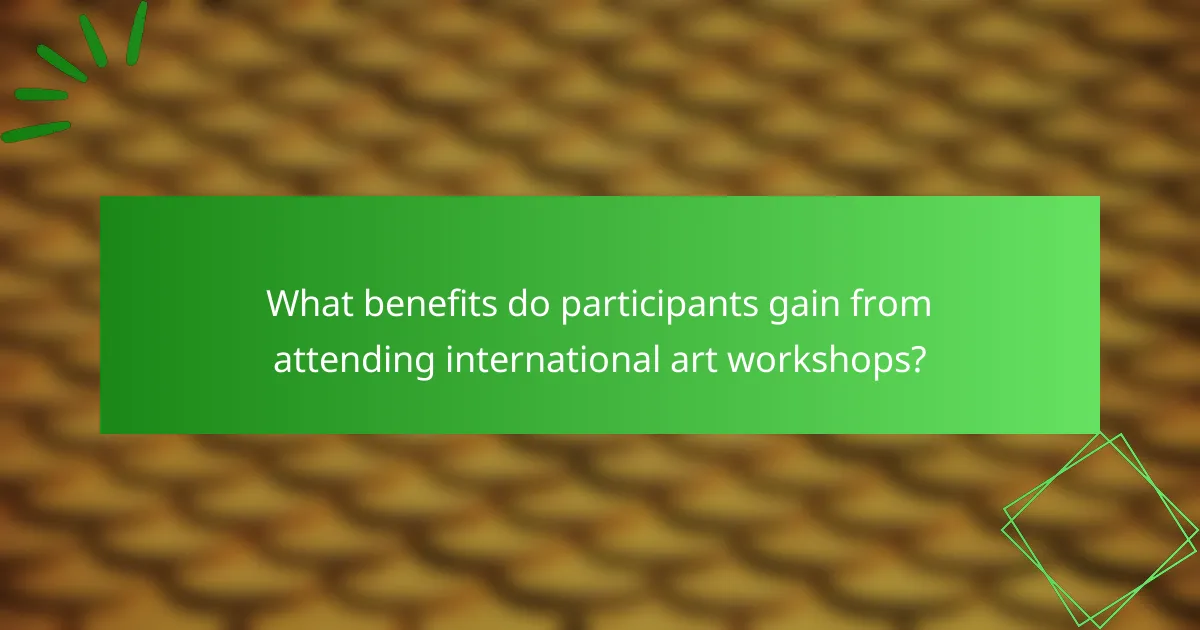
What benefits do participants gain from attending international art workshops?
Participants gain numerous benefits from attending international art workshops, including enhanced creativity, cultural exchange, and skill development. These workshops foster collaboration among artists from diverse backgrounds, enriching their perspectives. Participants often experience personal growth through exposure to new techniques and ideas. Networking opportunities with fellow artists can lead to future collaborations and exhibitions.
How do these workshops enhance artistic skills and creativity?
International art workshops enhance artistic skills and creativity by providing hands-on experiences, diverse perspectives, and collaborative environments. Participants learn new techniques and gain insights from various cultures, fostering innovation. Workshops often feature expert guidance, which helps refine individual styles and encourages experimentation. As a result, artists can expand their creative boundaries and develop unique expressions.
What role does networking play in participant experiences?
Networking significantly enhances participant experiences in international art workshops by fostering collaboration and cultural exchange. It enables artists to share diverse perspectives, techniques, and ideas, enriching the creative process. Participants often form lasting connections, leading to future collaborations and opportunities. Additionally, networking facilitates access to resources, mentorship, and exposure to different artistic practices, which can elevate individual artistic development.
How can workshops contribute to personal and professional growth?
International art workshops significantly enhance personal and professional growth by fostering creativity and cultural exchange. Participants gain new skills, expand their artistic techniques, and build valuable networks. These workshops promote collaboration, enabling individuals to share diverse perspectives and experiences. Additionally, exposure to various cultural practices enriches participants’ understanding of global art movements, enhancing their adaptability and innovation in their work.
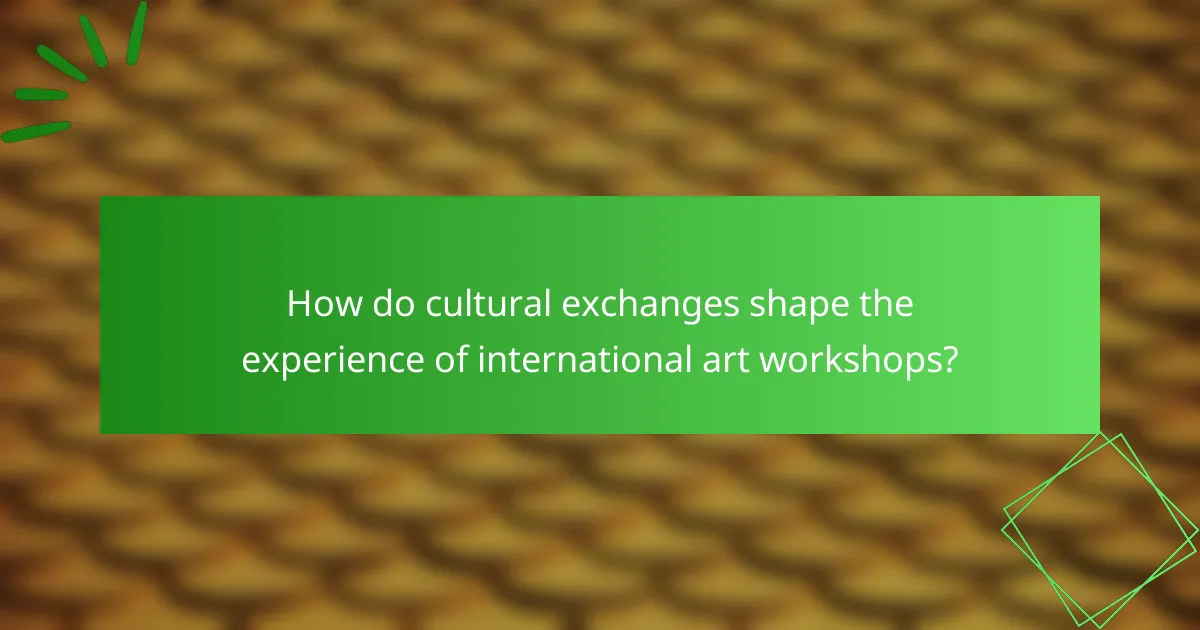
How do cultural exchanges shape the experience of international art workshops?
Cultural exchanges significantly enhance the experience of international art workshops by fostering collaboration and understanding. Participants engage with diverse artistic practices, which broadens their creative perspectives. This interaction cultivates a sense of community and encourages the sharing of unique cultural narratives. Workshops often incorporate local traditions, enriching the overall learning experience. As a result, artists develop new techniques and ideas that reflect a blend of global influences, making their work more innovative and relevant.
What are the key cultural elements integrated into workshop curricula?
Key cultural elements integrated into workshop curricula include local artistic techniques, traditional storytelling methods, and community engagement practices. These elements foster cultural exchange and enhance participants’ understanding of diverse perspectives. Additionally, workshops often incorporate regional materials and themes, promoting authenticity and creativity. The integration of these cultural aspects enriches the learning experience and strengthens global connections among artists.
How do participants navigate cultural differences during workshops?
Participants navigate cultural differences during workshops by fostering open communication and mutual respect. They engage in active listening and share personal experiences to build connections. This cultural exchange enhances understanding and collaboration among diverse groups. Strategies like establishing common goals and using visual aids further bridge gaps.
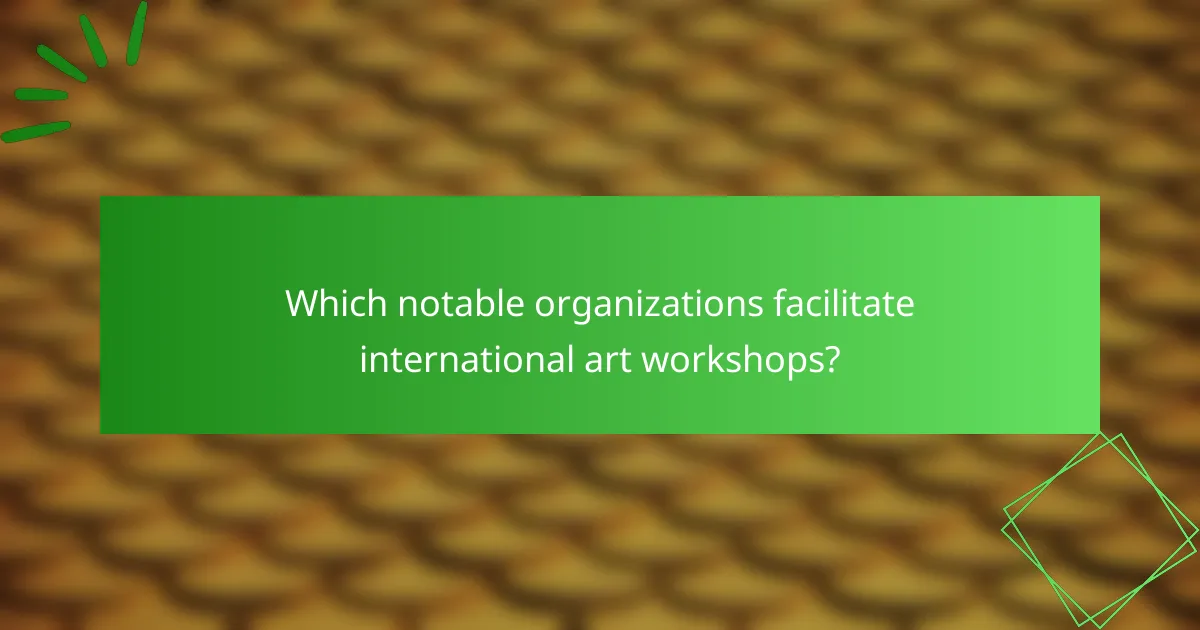
Which notable organizations facilitate international art workshops?
Notable organizations that facilitate international art workshops include UNESCO, the International Association of Art, and Art Omi. These organizations promote cultural exchange and collaboration among artists globally. Additionally, the International Art Workshop Network connects various institutions, enhancing access to diverse artistic practices. Each organization offers unique programs that enrich participants’ experiences and foster creativity.
What unique offerings do regional organizations provide?
Regional organizations offer unique international art workshops that emphasize local cultural expressions and collaborative learning. These workshops enhance cross-cultural understanding and provide participants with diverse artistic techniques. They often feature local artists as instructors, fostering authentic cultural exchange. Additionally, these programs can include community engagement projects, allowing participants to contribute to local art initiatives.
How do international partnerships enhance workshop quality?
International partnerships significantly enhance workshop quality by fostering diverse perspectives and expertise. Collaborating with artists from various cultural backgrounds enriches the learning experience. Participants gain exposure to different techniques and styles, promoting creativity and innovation. Additionally, these partnerships encourage cultural exchange, deepening understanding and appreciation of global art practices. This unique attribute of international collaboration creates a more dynamic and engaging environment for all involved.
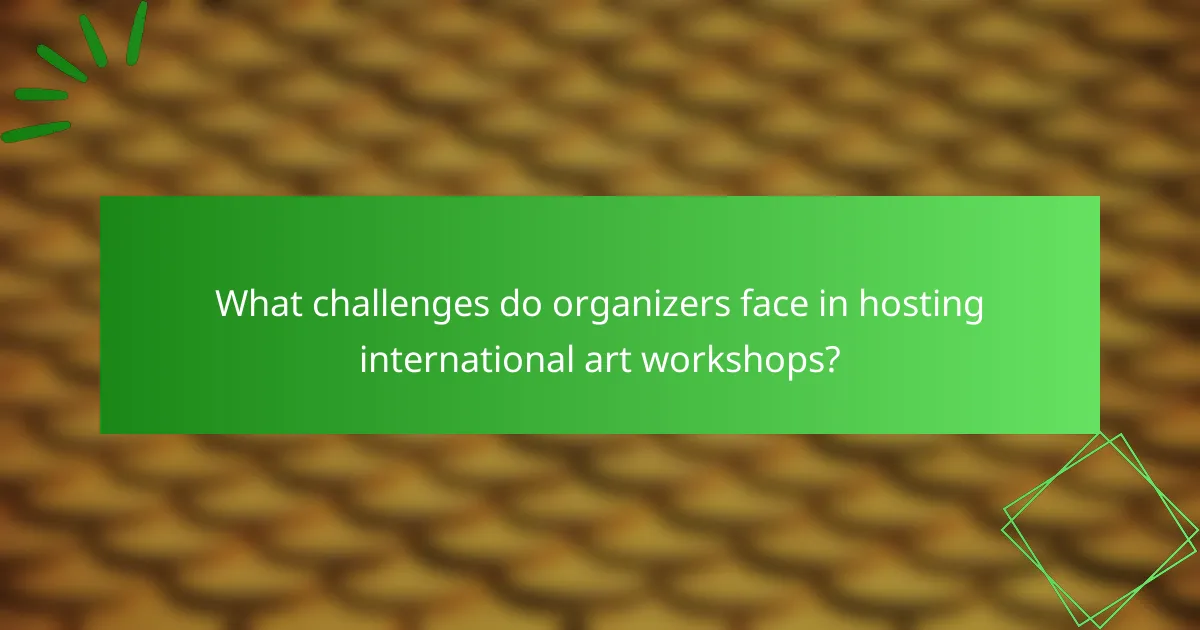
What challenges do organizers face in hosting international art workshops?
Organizers face several challenges when hosting international art workshops, including logistical issues, cultural differences, and funding constraints. Coordinating travel and accommodations for participants from various countries can be complex. Cultural misunderstandings may arise, impacting collaboration and communication. Additionally, securing financial resources for materials and venue can limit the scope of the workshop. Effective planning and flexibility are essential to overcome these obstacles.
How do logistical issues impact workshop execution?
Logistical issues can significantly hinder workshop execution by causing delays, miscommunication, and resource shortages. Effective planning is crucial for overcoming challenges such as transportation, venue availability, and material supply. For instance, inadequate transportation may limit artist participation, impacting cultural exchange. Additionally, miscommunication among stakeholders can lead to scheduling conflicts, ultimately affecting the workshop’s success. Addressing these logistical concerns helps ensure smooth operations and maximizes the benefits of international art workshops.
What are common barriers to participant engagement?
Common barriers to participant engagement in international art workshops include cultural differences, language barriers, logistical challenges, and varying levels of artistic experience. These factors can hinder effective communication and participation. Cultural differences may lead to misunderstandings, while language barriers can prevent full expression. Logistical challenges, such as travel costs and scheduling conflicts, may limit participation. Additionally, varying artistic experience levels can create feelings of intimidation or exclusion among participants. Addressing these barriers is essential for fostering an inclusive and engaging environment.
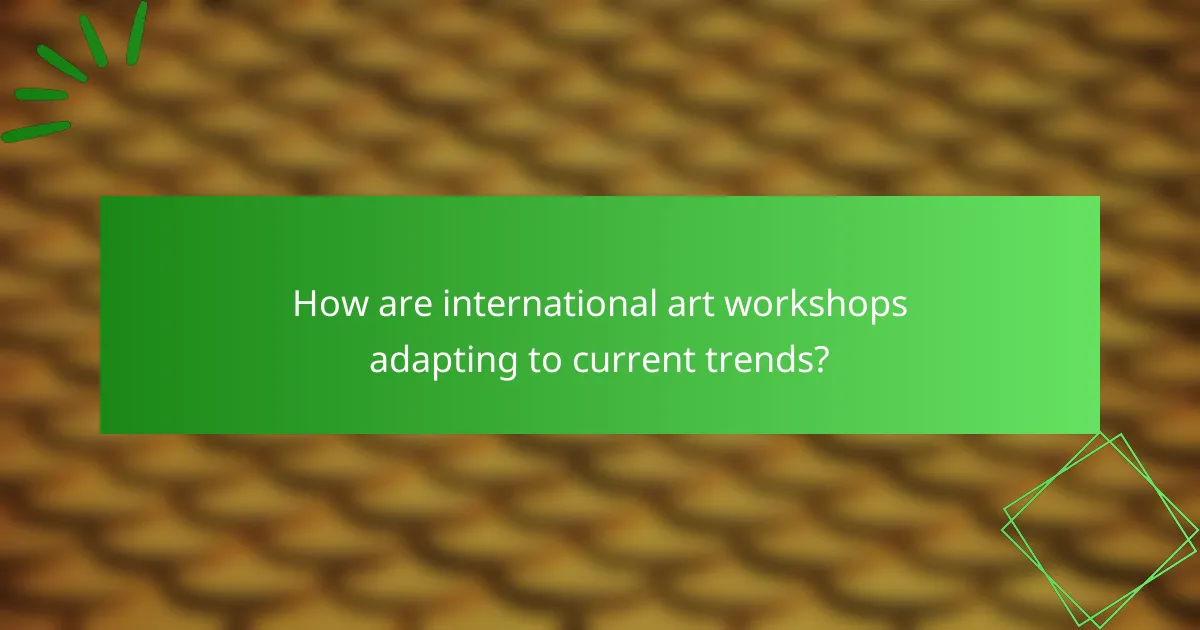
How are international art workshops adapting to current trends?
International art workshops are adapting by incorporating digital formats, emphasizing inclusivity, and focusing on sustainability. These changes enhance accessibility and foster global cultural exchange.
Digital workshops allow participants from diverse locations to connect, breaking geographical barriers. They often feature interactive elements, such as live-streamed sessions and online collaboration tools.
Inclusivity in workshops promotes participation from underrepresented groups. Programs are increasingly designed to accommodate various skill levels and backgrounds, enriching the learning experience.
Sustainability is becoming a core principle, with workshops prioritizing eco-friendly materials and practices. This approach aligns with global trends toward environmental awareness, attracting participants who value sustainability.
What technological advancements are influencing workshop formats?
Technological advancements are reshaping international art workshops by enhancing accessibility, collaboration, and interactivity. Virtual reality allows immersive experiences, while online platforms facilitate global participation. Digital tools enable real-time feedback, fostering cultural exchange among diverse artists. Innovations like 3D printing and augmented reality expand creative possibilities, making workshops more dynamic and inclusive.
Which sustainability practices are being adopted by organizers?
Organizers are adopting various sustainability practices in international art workshops. These include using eco-friendly materials, minimizing waste, promoting local artists, and implementing digital solutions to reduce paper usage. Additionally, workshops are increasingly focusing on community engagement and environmental education.
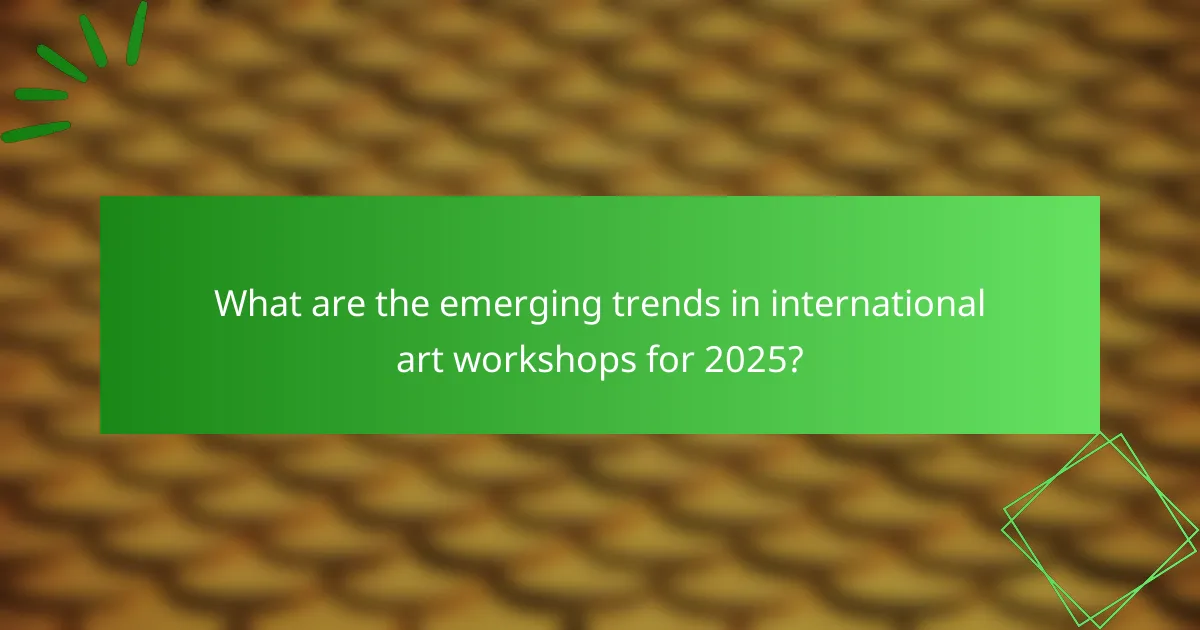
What are the emerging trends in international art workshops for 2025?
Emerging trends in international art workshops for 2025 include virtual reality integration, sustainability practices, and cross-cultural collaborations. These trends enhance accessibility, promote eco-friendly methods, and foster global artistic exchanges. Workshops will increasingly focus on immersive experiences, allowing participants to engage with art in innovative ways. Additionally, the emphasis on community involvement will strengthen cultural ties and broaden artistic perspectives.
How is the rise of virtual reality shaping workshop experiences?
The rise of virtual reality is transforming workshop experiences by enhancing engagement and accessibility. Participants can immerse themselves in interactive environments, fostering creativity and collaboration. Virtual reality also allows for global participation, breaking geographical barriers and promoting cultural exchange. These immersive experiences can simulate real-world scenarios, enriching learning outcomes and providing unique artistic perspectives.
What new artistic disciplines are being introduced in workshops?
International art workshops are introducing disciplines like digital art, mixed media, and performance art. These formats enhance cultural exchange and creativity. Digital art workshops focus on technology integration, while mixed media encourages innovative material use. Performance art fosters interactive experiences, allowing participants to express ideas dynamically. These new disciplines cater to diverse artistic interests and promote collaboration among artists from various backgrounds.
Which social issues are being addressed through art workshops?
Art workshops address various social issues, including mental health, community cohesion, and cultural identity. These workshops provide a platform for self-expression, fostering dialogue among participants. They promote inclusivity by engaging marginalized groups and enhancing social skills through collaboration. Additionally, art workshops can raise awareness about social injustices, encouraging activism and community engagement.
What best practices should participants follow to maximize their experience?
To maximize their experience in international art workshops, participants should actively engage, collaborate, and embrace cultural diversity. First, they should research the workshop’s format and objectives to align their expectations. Second, networking with fellow artists fosters collaboration and cultural exchange. Third, participants should be open to feedback, as it enhances learning and artistic growth. Lastly, documenting the experience through sketches or notes helps in reflecting on personal progress and insights gained during the workshop.
